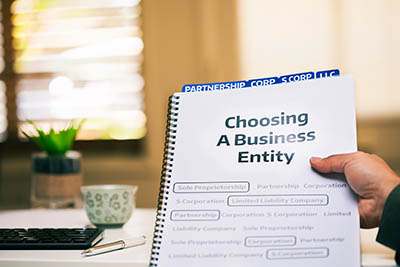
– stock.adobe.com)
In this competitive world, starting a retail business needs a lot of preparation and a series of decisions that’ll decide the fate of your business.
When starting a retail business, selecting the right business structure is one of the major decisions you have to make.
To make the right decision, you need to understand each business entity’s pros and cons.
In case you have been asking yourself why business structure matters, here is why.
It determines:
- How the business is taxed
- What are your liabilities
- How to get funding and capital
To help you make the right decision, we have put together a list of the 3 most common business structures for starting a retail business.
1. Sole proprietorship
A Sole Proprietorship is the best business entity to form when you want to start a small-scale business.
It is the most simple to form and operate as it does not need a lot of paperwork.
There is no legal distinction between the company and the person who operates it in Sole Proprietorship.
Pros of a sole proprietorship
Low taxes: This business structure has low taxes as the business income is combined with the business owner’s income and taxed as a single income.
Operational control: In Sole Proprietorship, all the control of the business lies in the hand of the business owner. You can operate the business the best way you see fit.
Easy to form: Forming a Sole Proprietorship is pretty straightforward and does not require a lot of paperwork.
Cons of a sole proprietorship
No liability protection: The major con of Sole Proprietorships is that all the liabilities are to be borne by the business owner.
Funding: It isn’t easy to get the financing for this business entity as it cannot go public.
2. Limited Liability Companies (LLCs)
LLCs combine the ease of operations found in Sole Proprietorships and the liability protection of Corporations.
LLCs are one of the most common business entities for starting a retail business.
You see, just like other business structures, it has its pros and cons.
Pros of LLCs
Limited liability: The liability of the business owner is limited, and the business losses will not affect the business owner’s personal assets.
Easy management: This business entity is pretty easy to manage. Moreover, it does not require so much paperwork to start.
Funding: Getting funding for LLCs is easier compared to a Sole Proprietorship, but not as easy as compared to a Corporation.
Cons of LLCs
Scalability: LLCs are not as scalable as Corporations and can’t go public and issue shares to raise mass funding.
3. Corporations
Corporations are the best business entities to start a large-scale enterprise.
Like the other business entities, it comes with its pros and cons
Pros of corporations
Liability protection: In a Corporation, the business is a legal entity separate from the owner, and thus the owner is exempted from the business’ liabilities.
Funding: It is easy to get funding as you can go public and the distribution of employees’ shares is easy in Corporations.
Cons of corporations
Formation: Corporations are quite difficult to create as they require a lot of paperwork and are the most expensive to form and run.
Taxes: You have to pay taxes on your personal income as well as corporate taxes, causing double taxation.
Final thoughts
The decision on which business entity best is for starting a retail business solely lies with you. Understand the needs of your business before you choose the best entity for your business.
Brett Shapiro is a co-owner of GovDocFiling. He had an entrepreneurial spirit since he was young. He started GovDocFiling, a simple resource center that takes care of the mundane, yet critical, formation documentation for any new business entity.











